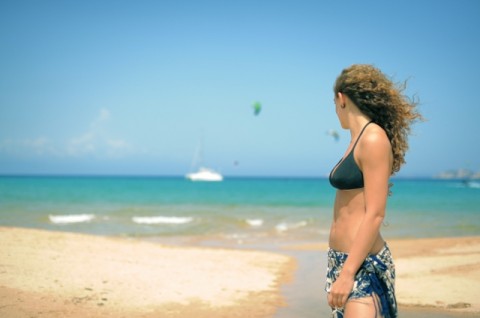
Grand Bahama is a beautiful island surrounded by sparkling, crystal-clear waters that range in color from turquoise to deep, emerald-green, and with miles of white beaches. The island is a combination of high-class resorts and quaint fishing villages. Although not the largest, or busiest, of the Bahamian islands, there is plenty to do for everyone, whether you are a sports lover, shopaholic, water-baby, nature-lover or simply want to relax and unwind in a tropical paradise.
The temperature is warm all year-round, ranging from high sixties in winter to high 80s in summer. The local currency is the Bahamas dollar, equivalent in value to the US dollar, which is widely accepted around the island. You can fly in to the island’s Grand Bahama International Airport, or island-hop on the ferry.
The capital is Freeport, which is a modern town with wide, tree-lined boulevards, and lots of shops, bars and restaurants. Because there is no sales tax, goods are very cheap to buy, and duty-free bargains widely available. One of the best places to shop is the International Bazaar, with over a hundred shops and restaurants which represent countries from around the world. The Bazaar is also home to the Straw Market, where you can purchase local arts and crafts; and a perfume factory where you can have a go at making your own fragrance.
Close by is the island’s premier resort, Lucaya. Although lots of the island’s beaches are great for watersports, with the sea-water warm all year-round, this beach is the perfect centre for swimming, snorkelling, fishing, knee-boarding, kayaking, parasailing and water-skiing, or for a fun ride on a banana boat.
There are 3 national parks on Grand Bahama, but the Lucayan National Park, is the only one where all six of the island’s different eco-systems can be found. As well as a glorious beach, there is a mangrove swamp, a coral reef teeming with colourful marine life, and a series of spectacular underwater caves which experienced scuba divers can explore. Brave divers can also charter a boat and go shark diving!
For those who prefer their sports on dry land, there are several premier golf courses around the island, as well as riding stables, tennis courts and cycling. If you are interested in nature, eco-tours are available, ranging from guided walks to jeep safaris, where you can enjoy the native flora and fauna.
All the resorts are quite modern, so there is not much in the way of historic sites or museums, although the islanders do love to celebrate their “Junkanoo” traditions, dating back to slave times. The art galleries are full of colourful Junkanoo-inspired works, and lively carnivals take place at Christmas-time and in summer.
There is plenty of night-life around the larger resorts, with bars, nightclubs and traditional jazz venues such as Tony Macaronis and Count Basie’s Square. Lots of restaurants serve international cuisine, but you should try the local dishes of spicy seafood, chicken or pork at least once – not to mention the island’s specialty, conch.
Most accommodation is in beach-front resorts, such as the Best Western Castaways Resort in Freeport, the Pelican Bay Resort in Lucaya or the Viva Wyndham at Fortuna Beach; but you can rent a villa or apartment if you prefer.